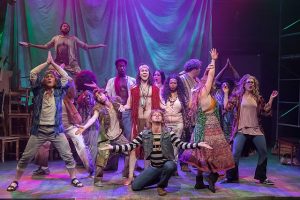RECOMMENDED
HAIR The American Tribal Love-Rock Musical is a revival of the infamous hippie era production that raised many eyebrows in its day and contributed significantly to the evolution of American musical theater.

It might be easy to simply see this current production of HAIR as riding a “permanent wave” of nostalgia. Or you might choose to see it as a “bald” faced celebration of 1960’s era youth, depicting the struggles a significant portion of the boomer generation experienced on the road to adulthood, which incidentally had a huge impact on modern culture.
The original production contemporaneously reported on that cultural shift in America as it simultaneously contributed to it. So it is impossible to speak about the current production without referencing its history.
The musical deals with themes of sex, drugs, war and racial divide wrapped in a musical genre that combine to reflect the voice of a generation. Loosely speaking it is composed in a rock idiom by Galt MacDermot who was not a rock & roll composer per se.
However, the music is a successful mix of styles borrowed from folk, rock, psychedelic, gospel and R&B. The opening song Aquarius sung admirably by Cherise Thomas was a breakout hit recorded by numerous performers. It speaks to the hope of a generation literally born out of WWII who witnessed the effects of Korea and faced now with Vietnam yearn for the ultimate time of peace.
What is important to note is that when originally performed this was not the subject matter or musical genres typically presented on a Broadway stage.
Add to this the bohemian clothing fashion combined with a heretofore unseen penchant for long haired males, a rejection of accepted female coiffure and an emerging unisex preference among African Americans to let their hair grow “natural” into what was commonly referred to as an “Afro or Fro” and you have the inspiration for the show’s title HAIR which became the very symbol of the American counter-culture.
This production made me view the loose story-line as a kind of flashback on the pre-induction life of the central character Claude Bukowski (Liam Quealy) as his “tribe” explores their sexuality and experiments with drugs as way to deal with their lack of control and looming threat of mortal danger presented by the potential of forced military conscription into an unpopular conflict during the Vietnam War Era.
Each member of the tribe represents a unique voice of the counter-culture who independently and collectively presents the audience with an in-your-face collection of songs aimed to shock and provoke thoughtful consideration of their observations of life’s challenges. In context this was a rare opportunity for the younger generation to speak openly and air their grievances to the previous generation in a public forum.
Songs like “Sodomy,” “Black Boys” and “White Boys” speak frankly about sex, while “Hashish” and “Ain’t Got No Grass” talk freely of drug use. “Donna” and “Frank Mills” are lighter laments about lost loves.
The theme of race relations runs like a loose thread through the production. Like the issue itself it is somewhat awkwardly interspersed throughout. I say that because it has no direct bearing on Claude. But it is central to the cultural struggle of the time and is clearly stated in the songs, “Colored Spade” and “Abie Baby.”
In the first forty minutes or so of this production I felt the cast proved they could sing, but was merely playing at being hippies. I was a bit skeptical of their commitment to the material. It seemed to lack authenticity.
This changed about the time that Sheila (Michelle Lauto) sang “Easy to Be Hard” after being rejected by boyfriend Berger (Matthew Keffer) which was preceded by a very enjoyable comic interlude “My Conviction” (Craig Underwood) and followed by another sweet number “Frank Mills” sung by Crissy (Leryn Turlington).
The first act ends with “Be-In Hare Krishna” and “Where Do I Go” which both address a need for spiritual guidance and closes with the now famous nude scene in which the cast bathed in psychedelic light illustrate their vulnerability and commitment to freedom.
In the second and final act the conflict is obvious. “he War,” “Three-Five-Zero-Zero “and “What A Piece of Work” is Man-speak to the military conflict, the human condition and impending doom. While “Good Morning Starshine” and “Let the Sun Shine In” offer a connection of spirituality and hopefulness in the face of destruction.
What is most distressing about HAIR is that many of us Boomers felt that these battles have been fought and to some degree considerably improved. But sadly it seems like this production has as much relevance today as it did in 1967 as we continue to struggle with military conflicts that challenge world peace resulting in danger, death and injury to our young men and women in service, and civil rights that continue to haunt our domestic ideals.
If you are an older theater-goer this is a perfect production to share with a teenaged or twenty-something child, grandchild or young friend. It’s a great way to say,” I understand what you are dealing with” and “we all need to continue to fight the fight.” Perhaps together we can “Let the Sunshine In” and welcome the Age of Aquarius when “peace will guide the planets and love will steer the stars.”
DETAILS: “Hair” runs through September 17, 2017 at the Mercury Theater, 3745 N Southport, Chicago. For tickets and other information visit Mercury.
– Reno Lovison
(Guest reviewer Reno Lovison is proud to say he auditioned for the original Chicago cast production of HAIR. He currently wears his hair shorter and produces business video, does content writing, blogging and business articles and has authored two non-fiction books.
